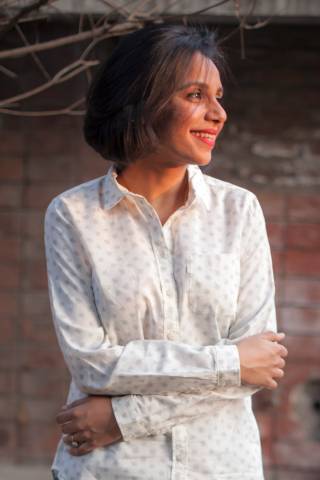
Associate Professor in Social Anthropology
Email: a.maqsood@ucl.ac.uk
My current research is concerned with difference, both in terms of its presence in ethnographic settings and what we assume about it in our theoretical thinking. Based on fieldwork on the experiences of upwardly mobile Hindus in Karachi, I am investigating how difference is produced and lived, in and through everyday encounters with Muslims. In collaboration with Leslie Fesenmyer (Birmingham) and Giulia Liberatore (Edinburgh) who work on inter-religious interactions in Nairobi and Palermo respectively, our aim is to study the forms, modes, and textures of living with difference in non-secular contexts in order to unsettle the universalizing claims of liberal tolerance. Our work is funded by the ERC grant, Multi-Religious Encounters in Urban Settings.
This work follows from my long-term interests in middle-class religiosity, kinship and intimate aspirations in urban Pakistan. My previous research has investigated linkages between Islamic piety, contested ideas on modernity and class politics in Lahore. With support from the ESRC, more recent work has explored discourses on intimacy, romance and marriage, with attention to the tensions between, on the one hand, intimate desires and, on the other hand, the economic pressures and familial obligations that ground every day, middle-class life. I also have an interest in state-sponsored displacement and violence against vulnerable groups that has focused on two separate areas. First, based on fieldwork amongst Pashtun displaced from the tribal areas along the Pak-Afghan border amidst U.S. drone attacks and ground military operations by the Pakistan army, I have explored the role of uncertainty, rumours, and conspiracies in local understandings of violence. Second, through a focus on the Orange Line Metro project in Lahore, I have developed an interest in infrastructure-related displacement of working-class groups and, in particular, the impact of resistance politics and compensation claims on kinship relations, aspirations, and notions of community.
Before coming to UCL, I was Lecturer in Social Anthropology at Manchester and, prior to that, ESRC Future Research Leaders Fellow at the Institute of Social and Cultural Anthropology and Junior Research Fellow at St Catherine’s College, Oxford. I was a Co-Investigator for the multidisciplinary project “Rebuilding Kinship and Care After Dislocation: Lahore and Colombo compared” (2017-2019), funded by the BA-GCRF Cities & Infrastructure Programme.
Selected publications:
2023. The Work of Time: Personhood, Agency and Negotiation of Religious Difference in Pakistan. Journal of the Royal Anthropological Institute 30(1).
2021. Victim, Broker, Activist, Fixer: Understanding Dispossession in Working Class Lahore. Environment and Planning D: Society and Space. (with F. Sajjad)
2021. Love as Understanding: Marriage, Aspiration and the Joint Family in Middle-Class Pakistan. American Ethnologist. 48(1), 93-104.
2021. Love in Liminality: The Modes and Spaces of Intimacy Middle-Class Pakistan. South Asia History and Culture. 12(2-3), 261-277.
2020. Crossing Ethnographic and Religious Boundaries: The Case for Comparative Reflection. Social Anthropology 28(2), 386-401. (with L. Fesenmyer and G. Liberatore).
2019. The Social Life of Rumors: Uncertainty in Everyday Encounters between the Military, Taliban and Tribal Pashtun in Pakistan. Comparative Studies in South Asia, Africa and the Middle East. 39 (3), 462-474.
2019. ‘Who Are the Taliban? The Deflection of Truth Amongst Tribal Pashtuns of Pakistan’, In Judith Scheele & Andrew Shryock (eds), The Scandal of Continuity: Form, Duration, Difference. Bloomington: Indiana University Press.
2017. The New Pakistani Middle Class. Cambridge, MA: Harvard University Press.
2015. ‘Moving On: Mobility Among Tribal Pashtuns’. Tanqeed Winter 2015.
2014. ‘Buying Modern’: Muslim Subjectivity, the West and Patterns of Islamic Consumption in Lahore, Pakistan. Cultural Studies, 28(1), 184-107.
 Close
Close

